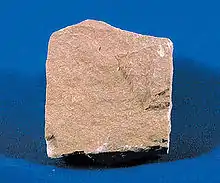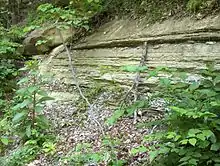粉砂岩
粉砂岩(英語:)又稱aleurolite[1],是一種碎屑沉積岩,主要由粉砂組成。與頁岩不同在於缺乏片狀裂理。 粉砂岩滲透率和孔隙率相對較低,但可形成天然氣緻密儲層岩石 [2][3]。 開采需要水力壓裂[4]。粉砂岩在古埃及用於製造雕像和化妝品調色板。 在 Wadi Hammamat 開采的粉砂岩最有名。是一種堅硬、細粒的粉砂岩,抗剝落[5]。
| 沉積岩 | |
 粉砂岩 |
描述

粉砂被定義為直徑為 2–62 μm 的顆粒,或在 Krumbein phi (φ) 尺度上為 4 至 8 的顆粒[6]。 粉砂岩是任何含有 50% 或更多粉砂大小顆粒的沉積岩[7]。 粉砂岩與砂岩不同,因為它們的孔隙更小,並且含粘土量大。雖然經常被誤認為是頁岩,但粉砂岩缺乏頁岩典型的片狀裂理。 粉砂岩可能含有結核 [8][9]. 且其風化面與層理無關。
來源
粉砂岩是一種不尋常的岩石,其中大部分粉砂顆粒由石英製成[10]。 石英粉砂的起源一直是很多研究和爭論的話題[11][12]。一些石英粉砂可能起源於細粒葉頁狀變質岩,而許多海相粉砂可能是生物成因[13][14]. 但大多數石英沉積物來自石英的花崗岩[15]. 花崗岩顆粒很大需要高能量地質作用粉碎這些顆粒[16]。 例如冰川磨蝕[17][18]. 在寒冷、構造活躍的山脈中風化;正常風化,特別是在熱帶地區[19][20]. 以及在炎熱的沙漠環境中由鹽形成[21]. 粉砂岩形成於相對安靜的沉積環境中,細顆粒可以從傳輸介質(空氣或水)中沉澱出來並在地表堆積[22]。 在濁積岩序列[23], [[三角洲<]]ref name=”Line”>Lineback, Jerry Alvin. "Deep-water sediments adjacent to the Borden Siltstone (Mississippian) delta in southern Illinois." Circular no. 401 (1966) </ref>,冰川沉積物[24] 和微地槽環境中都存在[25]。
參考文獻
- Gyöngyi Farkas Characterization of subterranean bacteria in the Hungarian Upper Permian Siltstone (Aleurolite) Formation Canadian Journal of Microbiology 46(6):559-64
- Clarkson, Christopher R.; Jensen, Jerry L.; Pedersen, Per Kent; Freeman, Melissa (February 2012). "Innovative methods for flow-unit and pore-structure analyses in a tight siltstone and shale gas reservoir". AAPG Bulletin. 96 (2): 355–374.
- Cao, Zhe; Liu, Guangdi; Zhan, Hongbin; Gao, Jin; Zhang, Jingya; Li, Chaozheng; Xiang, Baoli (May 2017). "Geological roles of the siltstones in tight oil play". Marine and Petroleum Geology. 83: 333–344. doi:10.1016/j.marpetgeo.2017.02.020.
- Ben E. Law and Charles W. Spencer, 1993, "Gas in tight reservoirs-an emerging major source of energy," in David G. Howell (ed.), The Future of Energy Gasses, US Geological Survey, Professional Paper 1570, p.233-252
- Shaw, Ian (2004). Ancient Egypt : a very short introduction. Oxford: Oxford University Press. pp. 44–45. ISBN 0192854194. Retrieved 2 October 2020
- Folk, R.L. (1980). Petrology of sedimentary rocks (2nd ed.). Austin: Hemphill's Bookstore. p. 145. ISBN 0-914696-14-9. Archived from the original on 2006-02-14. Retrieved 2 October 2020.
- Picard, M. Dane (1971). "Classification of Fine-grained Sedimentary Rocks". SEPM Journal of Sedimentary Research. 41. doi:10.1306/74D7221B-2B21-11D7-8648000102C1865D.
- Melezhik, Victor A.; Fallick, Anthony E.; Smith, Richard A.; Rosse, Danta M. (December 2007). "Spherical and columnar, septarian, 18 O-depleted, calcite concretions from Middle–Upper Permian lacustrine siltstones in northern Mozambique: evidence for very early diagenesis and multiple fluids". Sedimentology. 54 (6): 1389–1416. doi:10.1111/j.1365-3091.2007.00886.x.
- Middleton, Heather A.; Nelson, Campbell S. (May 1996). "Origin and timing of siderite and calcite concretions in late Palaeogene non- to marginal-marine facies of the Te Kuiti Group, New Zealand". Sedimentary Geology. 103 (1–2): 93–115. doi:10.1016/0037-0738(95)00092-5
- Nahon, D.; Trompette, R. (February 1982). "Origin of siltstones: glacial grinding versus weathering". Sedimentology. 29 (1): 25–35. doi:10.1111/j.1365-3091.1982.tb01706.x.
- Nemecz, Ernö; Pécsi, Márton; Hartyáni, Zsuzsa; Horváth, Timea (June 2000). "The origin of the silt size quartz grains and minerals in loess". Quaternary International. 68–71: 199–208. doi:10.1016/S1040-6182(00)00044-6
- Smalley, Ian (January 1990). "Possible formation mechanisms for the modal coarse-silt quartz particles in loess deposits". Quaternary International. 7–8: 23–27. doi:10.1016/1040-6182(90)90035-3.
- Leeder, M. R. (2011). Sedimentology and sedimentary basins : from turbulence to tectonics (2nd ed.). Chichester, West Sussex, UK: Wiley-Blackwell. ISBN 9781405177832
- Schieber, Jürgen; Krinsley, Dave; Riciputi, Lee (August 2000). "Diagenetic origin of quartz silt in mudstones and implications for silica cycling". Nature. 406 (6799): 981–985. doi:10.1038/35023143. PMID 10984049. S2CID 4417951
- Potter, Paul Edwin; Maynard, James; Pryor, Wayne A. (1980). Sedimentology of shale : study guide and reference source. New York: Springer-Verlag. ISBN 0387904301
- Assallay, A (November 1998). "Silt: 2–62 μm, 9–4φ". Earth-Science Reviews. 45 (1–2): 61–88. doi:10.1016/S0012-8252(98)00035-X.
- Kuenen, P. H. (1 December 1969). "Origin of quartz silt". Journal of Sedimentary Research. 39 (4): 1631–1633. doi:10.1306/74D71ED3-2B21-11D7-8648000102C1865D
- Riezebos, P.A.; Van der Waals, L. (December 1974). "Silt-sized quartz particles: a proposed source". Sedimentary Geology. 12 (4): 279–285. doi:10.1016/0037-0738(74)90022-0
- Iriondo, Martı́n (December 1999). "The origin of silt particles in the loess question". Quaternary International. 62 (1): 3–9. doi:10.1016/S1040-6182(99)00018-X.
- Pye, Kenneth (April 1983). "Formation of quartz silt during humid tropical weathering of dune sands". Sedimentary Geology. 34 (4): 267–282. doi:10.1016/0037-0738(83)90050-7
- Goudie, A.S.; Cooke, R.U.; Doornkamp, J.C. (June 1979). "The formation of silt from quartz dune sand by salt-weathering processes in deserts". Journal of Arid Environments. 2 (2): 105–112. doi:10.1016/S0140-1963(18)31786-5
- Lillie, Robert J. (2005). Parks and plates : the geology of our national parks, monuments, and seashores (1st ed.). New York: W.W. Norton. ISBN 0393924076.
- Jaworowski, K. (2013). Facies analysis of the Silurian shale-siltstone succession in Pomerania (northern Poland). Geological Quarterly, 44(3), 297-315. Retrieved from https://gq.pgi.gov.pl/article/view/8078 (页面存档备份,存于)
- Thomas, S. G.; Fielding, C. R.; Frank, T. D. (December 2007). "Lithostratigraphy of the late Early Permian (Kungurian) Wandrawandian Siltstone, New South Wales: record of glaciation?". Australian Journal of Earth Sciences. 54 (8): 1057–1071. doi:10.1080/08120090701615717. S2CID 46570542.
- Ethridge, F.G. (1977). "Petrology, Transport, and Environment in Isochronous Upper Devonian Sandstone and Siltstone Units, New York". SEPM Journal of Sedimentary Research. 47. doi:10.1306/212F70EF-2B24-11D7-8648000102C1865D